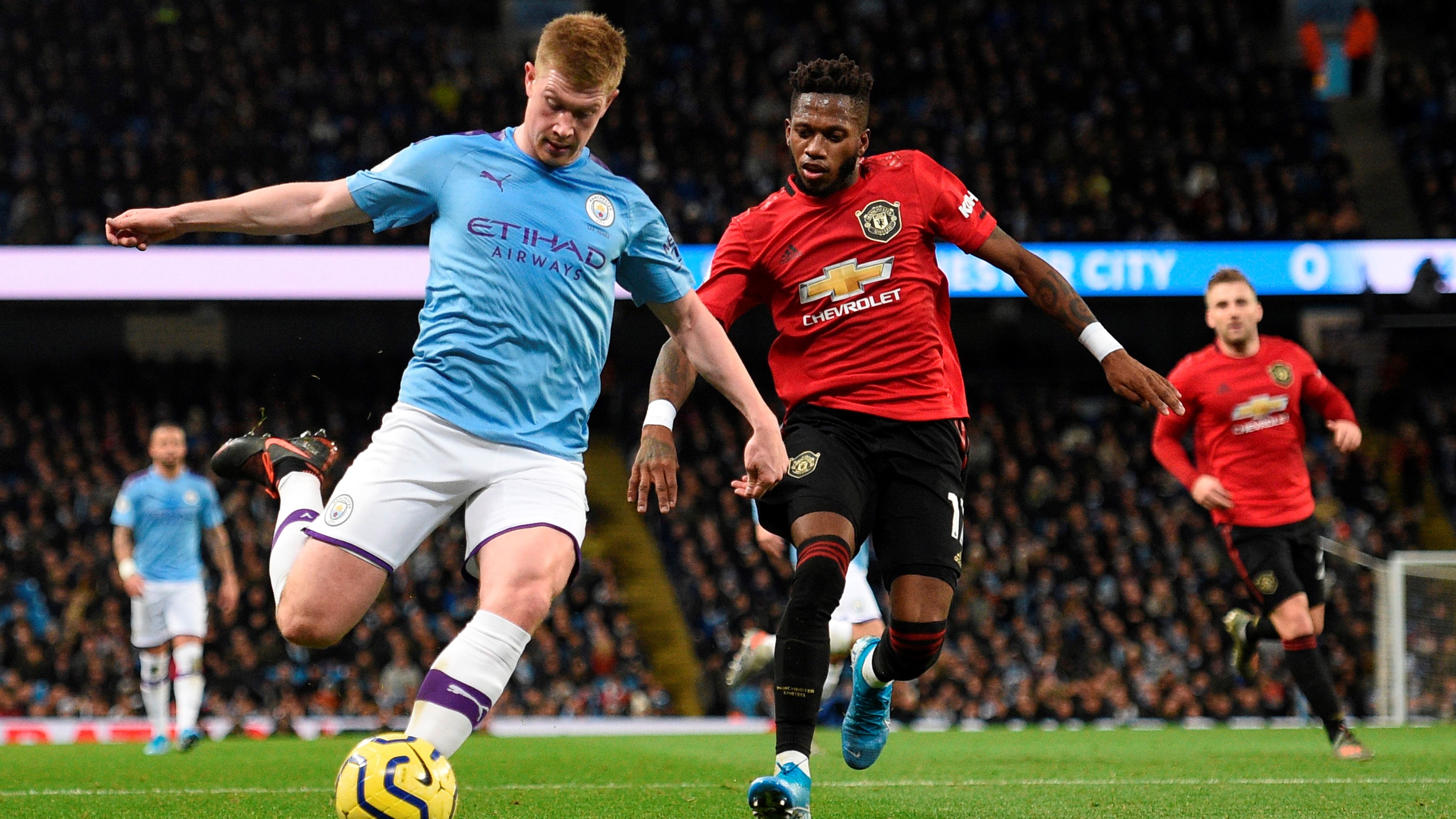Why BT Sport and Sky should refund subscribers for the suspended football
Opinion: Fans can’t expect refunds anytime soon, but why not?

Flick through your BT Sports channels or Sky Sports planner this weekend and you'd be forgiven for thinking it's 2014 – with the coronavirus cancellations affecting all but a smattering of non-league football matches in the UK, the major broadcasters have dug deep into their archives for re-runs and nostalgic filler that's normally reserved for daytime TV.
This is, of course, perfectly understandable. As recently as Wednesday 11 March, BT Sport had a packed schedule of Champions League football, including the live broadcast of a match in Liverpool where it was considered perfectly safe for over 50,000 people from around the country and abroad to be packed tightly into a football stadium.
The coronavirus cancellations then came with unparalleled speed and, of course, there are considerably more important things than football to worry about. And yet, one of those things for the millions of BT Sport and Sky subscribers who now face work uncertainty or higher household costs is their bank balances.
Yes, the broadcasters are covered by their contracts' terms and conditions, but an unprecedented situation demands an equivalent response – one which, so far, doesn't look likely. Here's why, from a football fan's perspective, the prospect of continuing to pay that hefty monthly premium just doesn't add up...
- These are the Best Netflix UK shows you need to watch
- Or watch our pick of the Best Amazon Prime series
- Surprise! Frozen 2 is coming to Disney Plus this weekend

The Big Freeze
Who’d have thought fresh-faced Mikel Arteta would be the man to bring the Premier League juggernaut to its knees?
Just hours after the UK government had announced that sporting events would be going ahead as normal – despite the escalating measures being taken by other countries around the world to inhibit the spread of coronavirus – it was announced that the former Everton midfielder and current Arsenal head coach had tested positive for Covid-19.
Without football, TV subscriptions would be a fraction of what they cost now.
The Gunners’ game against Brighton & Hove Albion on Saturday afternoon was postponed, and after Chelsea’s Callum Hudson-Odoi joined the Spaniard on the infected list the next morning, the decision was taken to suspend the entire Premier League (and all other professional matches) until at least the 3rd of April. Many fixtures in Scotland, Wales and Northern Ireland have also been called off.
Get daily insight, inspiration and deals in your inbox
Sign up for breaking news, reviews, opinion, top tech deals, and more.
Normally it takes a lot to prevent a top-flight game going ahead. Manchester United’s match against Bournemouth in 2015 was delayed for two days after a suspect package was found inside Old Trafford, and Liverpool vs Newcastle was postponed when the whole country lost its proverbial over the death of Princess Diana in 1997.
But you have to go back to the ‘Big Freeze’ of 1963, when Britain recorded the coldest month of the 20th century, to find games being postponed in large numbers and for any real length of time. That year, an FA Cup tie between Sheffield United and Bolton Wanderers wasn’t played until three months after its originally scheduled date, but we haven’t seen a widespread suspension like this one since World War II.

Expensive tumbleweed
Of course, the game is very different now to what it was back then. Today, TV calls the shots, moving five Premier League games per typical matchday weekend to fill up its schedules: usually two on Saturday, two on Sunday and one on Monday night.
That’s only 7.5 hours if you take each one to last 90 minutes, but add in all the preamble and post-match analysis and it makes up a significant proportion of the programming, not to mention the hours and hours of games from the EFL, Germany’s Bundesliga and other foreign leagues that are also televised.
Surely the broadcasters can’t justify charging £42 a month for golf, rugby league and WWE?
The suspensions have left gaping holes in the channels’ weekend schedules, with back-to-back episodes of Sky’s Premier League Years where games featuring Aston Villa, Chelsea, Wolves and West Ham should be. With fans paying a significant chunk of their monthly subscription fees to access the sports channels (currently £42 a month for both Sky Sports and BT Sport), shouldn’t they expect to be reimbursed for all the games that aren’t on?
Without football, TV subscriptions would be a fraction of what they cost now. The rights to show Premier League games live on TV between 2019 and 2022 were sold for over £4.4 billion in February 2018 and those costs are passed onto the viewer.
Sky Sports, in particular, has doubled down on Premier League games in recent years, giving up its rights to Spain’s La Liga and the Dutch Eredivisie as the costs involved in showing the English top-flight spiralled. While BT Sport shows fewer Premier League games than Sky, the suspension of the Champions League and Europa League will eat into its offerings next week and possibly beyond.
Surely the broadcasters can’t justify charging £42 a month for golf, rugby league and WWE, particularly when wrestling’s not even a real sport?

The response so far
Neither Sky or BT Sport have made any commitment to refunding subscription costs – and when we asked whether there were any plans to do so, both broadcasters made almost identical announcements.
Sky Sports managing director Rob Webster said: “We recognise that it is a fast-moving situation and we are working at speed to ensure we continue to deliver for all of our customers. A number of sporting events have been postponed, but not cancelled, so we expect to be able to show these when they are rescheduled.”
A similar statement from BT Sport read: “We apologise to customers about the changes to the BT Sport schedule this month due to the impact of Covid-19. The situation is evolving rapidly and we are working with the leagues to continue to broadcast live sport wherever possible and broadcast games when they are rescheduled over the coming months.”
As it stands, though, a resumption of matches early next month seems unlikely at best. With the virus not expected to peak in the UK until May or June, The Guardian claims that “senior administrators” within the game expect the disruption to last much longer, while an executive at a Premier League club believes there’s a realistic chance that the current season will never be finished. Hard luck, Liverpool fans, the wait goes on.
A sporting gesture
It’s almost certainly still too early to say, and the health of those individuals affected should be everybody’s first priority here, but whether it’s the TV companies or the Premier League itself that coughs up the cash, subscribers deserve to be reimbursed for whatever they end up missing out on.
Of course, those who are on a contract-free monthly pass can simply cancel, or perhaps just make the timely switch to a Now TV entertainment pass. But subscribers should be compensated – after all, it’s their money that has enabled the Premier League to become the all-conquering force that it is today. Oh, and a bit of financial help for the lower-league teams that rely almost entirely on gate receipts for survival wouldn’t go amiss either.
While the armchair fan is hardly the most put-upon of football supporters, a 2019 study by eToro found that the average match-going fan spends 40% more on TV subscriptions now than they did five years ago. Considering the TV companies often seem unmoved by inconveniencing supporters and costing them unnecessary expense with awkward kick-offs, isn’t it time they felt the pinch too?
Tom Wiggins is a Freelance Content Manager. He has been writing for various magazines and websites for the past years including MSN South Africa, MSN UK, MSN, MSN Canada, TechRadar, Yahoo Sport UK, Red Bull, JAMA Oncology, TrustedReviews, FourFourTwo, ShortList, Wareable, Stuff India, Stuff (UK), FACT Magazine, Louder, Metro.News, PC & Tech Authority, The Set Pieces, Decrypt Media, FourFourTwo Australia, In Bed With Maradona, The Ambient, Inside Sport, The Baltimore Post, My Office News.